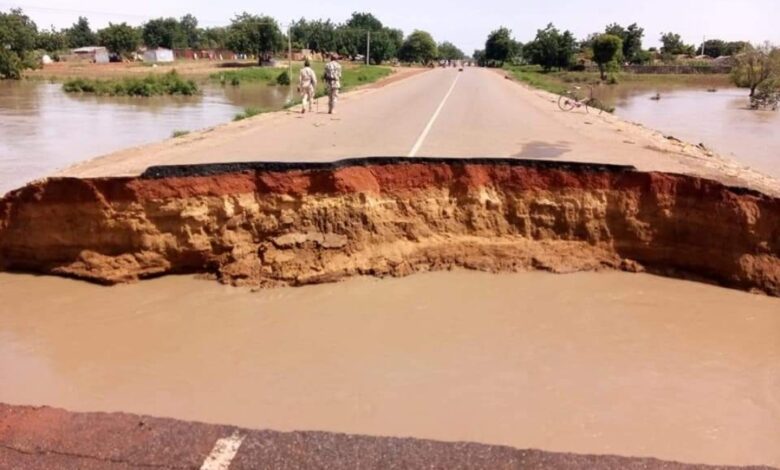4 Killed, 7,000 Households Displaced As Flood Destroys Bridge Linking Borno, Yobe Communities
Days of torrential downpours have caused flooding that claimed lives, destroyed a highway bridge, and displaced thousands of residents in Yobe, Northeast Nigeria.

Flooding caused by a torrential downpour on Monday, Aug. 29, brought down a bridge on a major highway linking Borno and Yobe states in Northeast Nigeria, officials said.
Four lives were lost to the flood, which also displaced more than 7,000 households in communities around the boundaries shared by Borno and Yobe states.
Officials of the Yobe State Emergency Management Agency (YOSEMA) said the most affected are communities in the Gulani and Gujba council areas.
Executive Secretary of SEMA, Mohammed Goje, said the destroyed bridge was located near Katarko on the highway that links Damaturu, Yobe state capital, with Biu town in Borno State.
Goje said most of the affected victims have been evacuated and camped in some of the nearby public schools.
He also said lives were lost in the flooding disaster. “The impacts of the reported flooding have assumed a threatening proportion, resulting in loss of lives and properties,” he noted.
“Over 11 communities in Gulani and one in Gujba town were affected by flooding as a result of a heavy downpour. The flooding has led to the displacement of thousands of households across 11 communities in the two LGAs. Livestock and food reserves worth millions of Naira were swept away by the flood.
“Unfortunately, four persons have been reported dead, including a police officer, while scores of others were injured.
“The affected four communities (Gulani, Bara, Gagure and Njibulwa) were rendered inaccessible as the main bridge linking the town has been damaged and washed away because of the flooding.”
The Governor of Yobe State, Mai Mala Buni, has directed SEMA to mobilise resources and intensify efforts in bringing “immediate relief to the affected communities while alternate routes should be opened to support the movement of inaccessible communities”.
Some of the evacuated survivors recalled that the last time such devastating flooding was recorded in the area was in the late 70s “when a major bridge around Bara was demolished in raging water that left hundreds of people displaced and graveyards washed away”.
The collapsed bridge will, in the coming days, worsen the plight of commuters between Yobe and Borno as they would have to take a longer detour through Gombe State before getting to their destination.
Support Our Journalism
There are millions of ordinary people affected by conflict in Africa whose stories are missing in the mainstream media. HumAngle is determined to tell those challenging and under-reported stories, hoping that the people impacted by these conflicts will find the safety and security they deserve.
To ensure that we continue to provide public service coverage, we have a small favour to ask you. We want you to be part of our journalistic endeavour by contributing a token to us.
Your donation will further promote a robust, free, and independent media.
Donate HereStay Closer To The Stories That Matter




